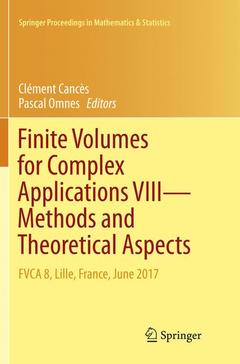PART 1. Invited Papers. Chi-Wang Shu, Bound-preserving high order finite volume schemes for conservation laws and convection-diffusion equations.-E.D. Fernandez-Nieto, Some geophysical applications with finite volume solvers of two-layer and two-phase systems.-Thierry Gallouet, Some discrete functional analysis tools.-Yuanzhen Cheng, Alina Chertock and Alexander Kurganov, A Simple Finite-Volume Method on a Cartesian Mesh for Pedestrian Flows with Obstacles.- PART 2. Franck Boyer and Pascal Omnes, Benchmark on discretization methods for viscous incompressible flows. Benchmark proposal for the FVCA8 conference : Finite Volume methods for the Stokes and Navier-Stokes equations.-Louis Vittoz, Guillaume Oger, Zhe Li, Matthieu De Leffe and David Le Touze, A high-order Finite Volume solver on locally refined Cartesian meshes.-Daniele A. Di Pietro and Stella Krell, Benchmark session : The 2D Hybrid High-Order method.-Jerome Droniou and Robert Eymard, Benchmark: two HybridM
imetic Mixed schemes for the lid-driven cavity.-Eric Chenier, Robert Eymard and Raphaele Herbin, Results with a locally refined MAC scheme - benchmark session.-Sarah Delcourte and Pascal Omnes, Numerical results for a discrete duality finite volume discretization applied to the Navier-Stokes equations.-Franck Boyer and Stella Krell and Flore Nabet, Benchmark session : The 2D Discrete Duality Finite Volume Method.-P.-E. Angeli, M.-A. Puscas, G. Fauchet and A. Cartalade, FVCA8 benchmark for the Stokes and Navier-Stokes equations with the TrioCFD code – benchmark session.-PART 3. Theoretical Aspects of Finite Volumes. Franc¸oise Foucher, Moustafa Ibrahim and Mazen Saad, Analysis of a Positive CVFE Scheme For Simulating Breast Cancer Development, Local Treatment and Recurrence.-Christoph Erath and Dirk Praetorius, Céa-type quasi-optimality and convergence rates for (adaptive) vertexcentered FVM.-Helene Mathis and Nicolas Therme, Numerical convergence for a diffusive limit of the Goldstein-Taylor system on bounded domain.-Florian De Vuyst, Lagrange-Flux schemes and the entropy property.-Caterina Calgaro and Meriem Ezzoug, $L^\infty$-stability of IMEX-BDF2 finite volume scheme for convection diffusion equation.-Raphaele Herbin, Jean-Claude Latche and Khaled Saleh, Low Mach number limit of a pressure correction MAC scheme for compressible barotropic flows.-T. Gallouet, R. Herbin, J.-C. Latche and K. Mallem, Convergence of the MAC scheme for variable density flows.-J. Droniou, J. Hennicker, R. Masson, Uniform-in-time convergence of numerical schemes for a two-phase discrete fracture model.-Claire Chainais-Hillairet, Benoıt Merlet and Antoine Zurek, Design and analysis of a finite volume scheme for a concrete carbonation model.-Rita Riedlbeck, Daniele A. Di Pietro, and Alexandre Ern, Equilibrated stress reconstructions for linear elasticity problems with application to a posteriori error analysis.-Patricio Farrell and Alexander Linke, Uniform Second Order Convergenceof a Complete Flux Scheme on Nonuniform 1D Grids.-J. Droniou and R. Eymard, The asymmetric gradient discretisation method.-Robert Eymard and Cindy Guichard, DGM, an item of GDM.-Claire Chainais-Hillairet, Benoıt Merlet and Alexis F. Vasseur, Positive lower bound for the numerical solution of a convection-diffusion equation.-Franc¸ois Dubois, Isabelle Greff and Charles Pierre, Raviart Thomas Petrov Galerkin Finite Elements.-Naveed Ahmed, Alexander Linke, and Christian Merdon, Towards pressure-robust mixed methods for the incompressible Navier-Stokes equations.-Thierry Goudon, Stella Krell and Giulia Lissoni, Numerical analysis of the DDFV method for the Stokes problem with mixed Neumann/Dirichlet boundary conditions.-J. Droniou, R. Eymard, T. Gallouet, C. Guichard and R. Herbin, An error estimate for the approximation of linear parabolic equations by the Gradient Discretization Method.-M. Bessemoulin-Chatard, C. Chainais-Hillairet, and A. Jungel, Uniform $L^\infty$ estimates for approximate solutions of the bipolar driftdiffusion system.-Abdallah Bradji, Some convergence results of a multi-dimensional finite volume scheme for a time-fractional diffusion-wave equation.-Nina Aguillon and Franck Boyer, Optimal order of convergence for the upwind scheme for the linear advection on a bounded domain.-Matus Tibensky, Angela Handlovicova, Numerical scheme for regularised Riemannian mean curvature flow equation.-Ahmed Ait Hammou Oulhaj, A finite volume scheme for a seawater intrusion model.-Clement Cances and Flore Nabet, Finite volume approximation of a degenerate immiscible two-phase flow model of Cahn-Hilliard type.-Clement Cances, Claire Chainais-Hillairet and Stella Krell, A nonlinear Discrete Duality Finite Volume Scheme for convection-diffusion equations.-Wasilij Barsukow, Stationarity and vorticity preservation for the linearized Euler equations in multiple spatial dimensions.-Jan Giesselmann and Tristan Pryer, Goal-oriented error analysis of a DG scheme for a secondgradient elastodynamics model.-Alain Prignet, Simplified model for the clarinet and numerical schemes.- Author Index.




